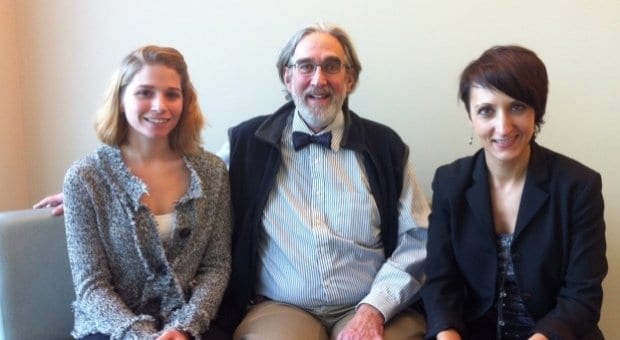A team of researchers is seeking participants for a study that will help physicians better address the needs of gay men who have been diagnosed with prostate cancer.
“The overall goal of this is to better inform physicians in how they can help their patients make better treatment choices and better know the sexual side effects of treatment,” says Ariel Handy, research assistant for the Compass study, a joint project of the BC Cancer Agency and the University of British Columbia. “We would like at least 15 to 20 men to talk to by springtime.”
The researchers are particularly interested in interviewing gay men and other men who have sex with men who are under the age of 71, have a diagnosis of non-metastatic prostate cancer, have received treatments with curative intent and can provide informed consent. Participants who complete the interview will receive a $30 honorarium.
“Participants should be willing to talk to about their sex life,” Handy says. “Some of the questions are personal, including topics around sexual functioning before and after treatment diagnosis and other things that they may talk about with their doctor. It is personal, and as long as they are comfortable with that it’s very simple and straightforward.”
The information gained will be used to create an assessment tool that will be distributed to physicians to aid with their treatment of gay men who have received a prostate cancer diagnosis.
Compass is being directed by principal investigator Tsz Kin Lee, a radiation oncologist who treats prostate cancer patients. Lee thinks the medical system focuses on heterosexual prostate-cancer patients and fails to address the specific needs of the gay community, especially around their sexual practices.
“Sex is an integral part of male health,” Lee says by email. “For prostate cancer patients, the impact of treatments on sexual function is ranked consistently as a major cause of diminished quality of life. As a gay physician, I have noticed this problem is especially pronounced in [the MSM] population.
“First, there are multiple barriers for the MSM population to access health care. Second, the majority of qualitative and quantitative research efforts relevant to prostate cancer sexual health focus on heterosexual sexual activity and relationships. Similar trend is observed for development of sexual quality of life assessment tool for prostate cancer, in which participants are assumed to be involved only in heterosexual sexual activity and relationship. This oversight has led to lack of credible scientific knowledge that can guide MSM treatment decision,” Lee writes.
Lee says that Compass is the first step in studying the sexual health of MSM and that the tool may be expanded to address other cancers or diseases that can affect the sexual well-being of gay men.
“I’ve been doing prostate cancer research for about a dozen years. I did my PhD in it, and a lot of my work since has focused on prostate cancer,” says John Oliffe, a professor at UBC’s School of Nursing who is one of the project’s co-investigators.
“I studied Australian men and how they experienced prostate cancer in the early 2000s, and since I’ve moved here I’ve looked at prostate cancer support groups and how they function, and very few gay blokes go to those groups. It begs the question: where do they get their support and what are their needs? Those questions haven’t been answered in a very systematic way.”
Oliffe explains that much of the current information on gay male prostate-cancer patients is anecdotal, leading some researchers and healthcare providers to question how they can come up with solutions if they can’t describe the problems.
“You don’t even know if you’re asking the right questions, and that’s probably one of the novel parts of this study,” he says. “It’s trying hard to figure out the questions we should be asking and the best way to ask them in order to drive towards supports and intervention for fellows who I think are being ignored.”
Co-investigator Richard Wassersug, a prostate cancer survivor, emphasizes that while gay men are not at higher risk of developing prostate cancer than straight men, the treatments can have an especially harmful effect on their sex lives.
“One of the serious concerns is that, firstly, all treatments for prostate cancer have a negative consequence on sexual function,” says Wassersug, who serves as co-director of the Prostate Cancer Supportive Care Program at the Vancouver Prostate Centre.
“Surgery, radiation or hormonal therapy all have a very strong chance of producing erectile dysfunction. Seen from a heterosexual perspective, this is usually discussed in terms of penile-vaginal penetration, but, for instance, if one is involved in anal sex, the needs are quite different, and none of the medical sort of assessment surgery instruments have looked specifically at the needs of the population who might be involved in anal sex.”
He says a penis that is firm enough to penetrate a vagina may not be able to penetrate an anus. He also notes that radiation treatments can damage the rectal walls.
Wassersug feels that “too many” prostate cancer patients — both gay and straight — feel they weren’t properly warned about the consequences of their treatment.
“These men may not have had the information or been asked about it to include the information in their treatment decision,” he says.
“It’s also psychological,” he continues. “I think we’d all like our doctors to know what we really do in our sexual lives and be accepting, and if they are not asking, we don’t know if they are. Most people, gay or straight, don’t talk about their sex lives unless the medical system asks. Just having these questions asked should help improve communication between gay patients and their doctors and opens the way for the doctor and patient to talk about it.”

 Why you can trust Xtra
Why you can trust Xtra


